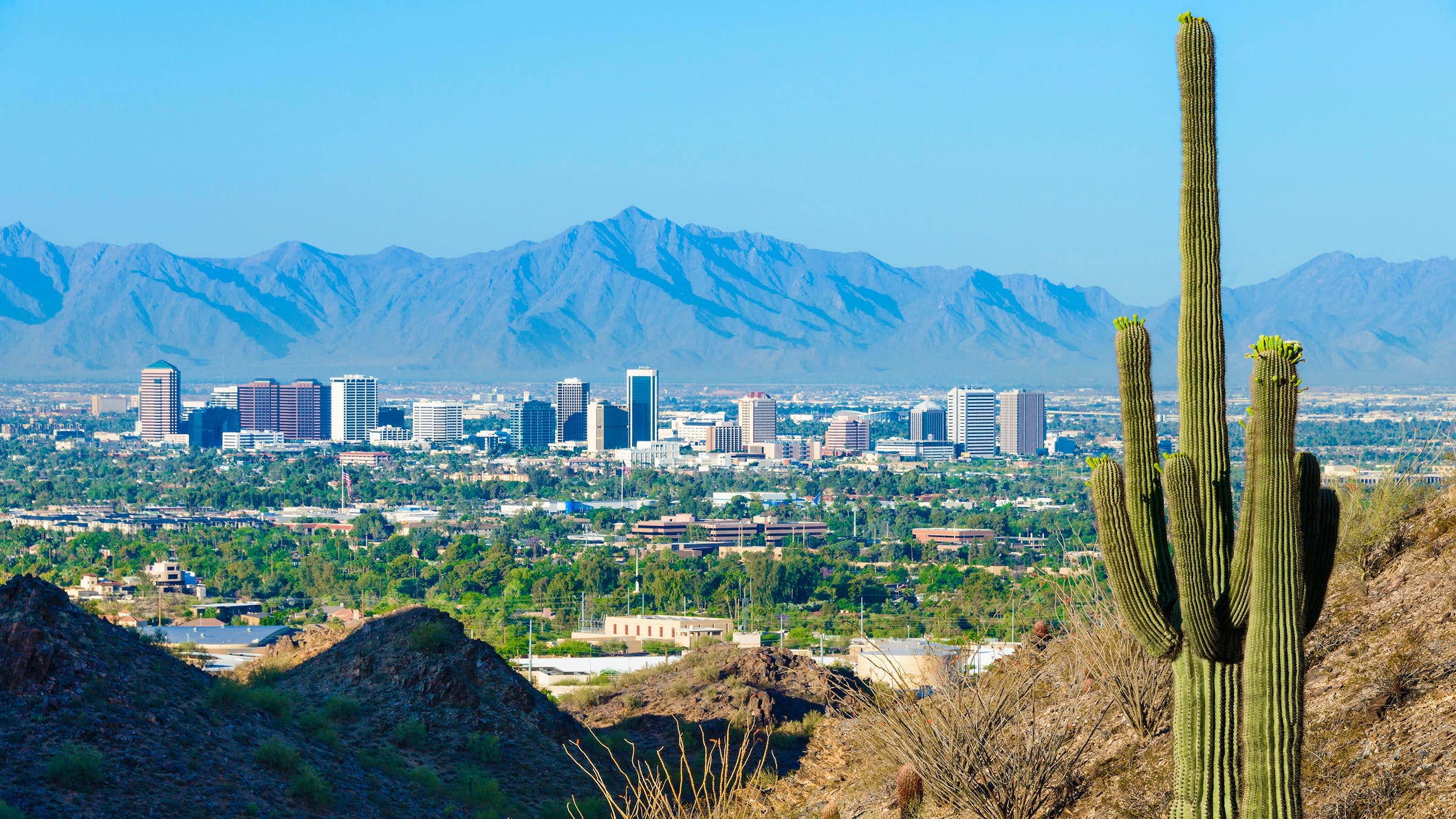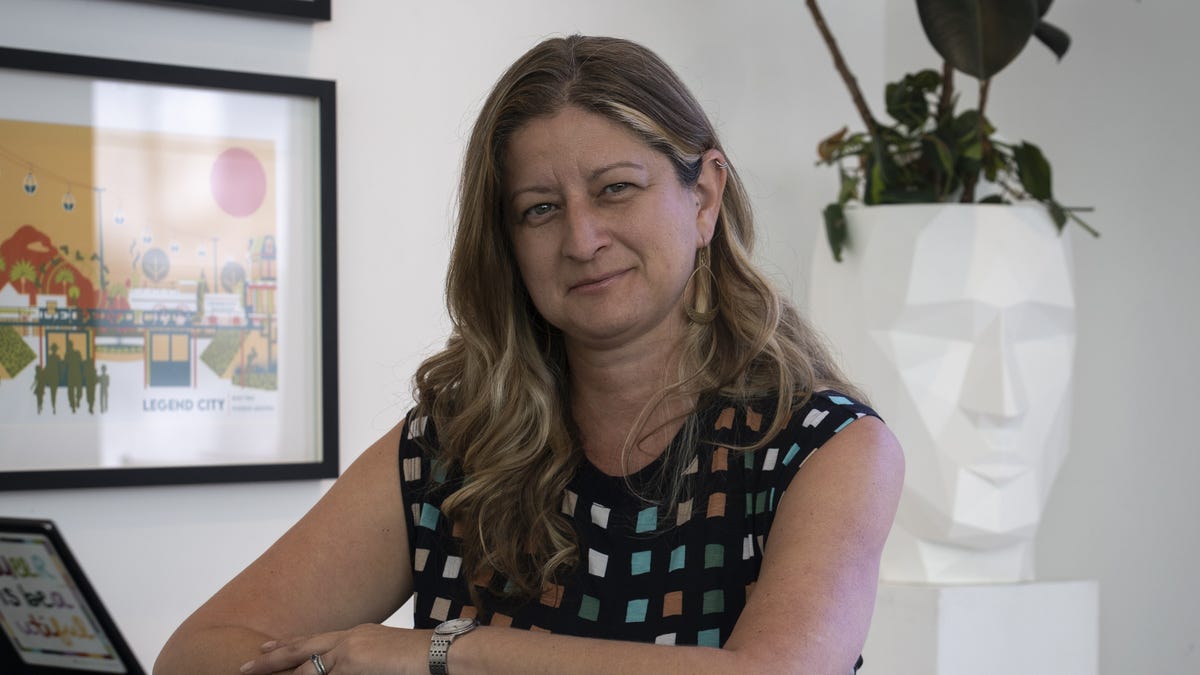
What to know about Phoenix, Arizona, the 5th largest city in the US
Phoenix, Arizona’s capital, is the fifth largest city in the U.S. and a destination for world-class resorts, spring training and award-winning restaurants.
The Republic
Sitting in a bright, open-concept coffee shop filled with plants and quirky artwork, Michele White, executive director of the Greater Phoenix Equality Chamber of Commerce, gets caught up on emails and scheduling meetings.
Dialog, located on Roosevelt Row in downtown Phoenix, serves as one of White’s many offices. Her workday rarely follows a predictable rhythm. She moves seamlessly between meetings with business owners and community events.
The coffee shop is owned by a fellow member of the chamber, which serves the Valley’s queer- and ally-owned small businesses. Their goal is to uplift entrepreneurs by providing them with visibility, support and access to necessary resources.
White, who identifies as queer, leads with adaptability. She juggles advocacy, small business assistance, crisis management and emotional support.
“I’m providing therapy on some level a lot of the time,” she said. “Small business ownership is hard, and we kind of take that on with them.”
That empathetic leadership, combined with nearly three decades of nonprofit and fundraising experience, is what keeps the equality chamber moving forward, even in the face of unprecedented political and economic headwinds.
Being ‘the glue’ in queer business community
White took the helm of the equality chamber during a time of transformation, not just for the chamber, but for Arizona’s LGBTQ+ business community. What started as a volunteer-run group with a handful of members is now a nonprofit with more than 350 active businesses and three paid staffers.
According to Matt Parker, the chamber’s board president, White has been a transformative force.
“She brings such heart and depth to the role. She doesn’t just run a chamber, she uplifts people,” he said. “Michele has built trust and relationships across the Valley that you simply can’t manufacture. She’s the glue.”
White listens closely to business owners to identify what they need, then matches them with the right organizations — such as funding agencies, mentorship programs, and technical assistance — often serving as a bridge between the entrepreneurs and their tools for success.
“There are so many resources out there for small businesses, but a lot of these agencies don’t have a marketing budget to get the word out,” White said. “Small business owners don’t have the time to go searching; their heads are down just trying to survive.”
Many of the people White works with need more than a spreadsheet of grants. They need someone who understands, someone who’s been there, and White certainly has.
Deep roots in local business community
White grew up immersed in her family-run small businesses; her father was a locksmith and her mother ran the books. Her childhood was spent working in her family’s home office or helping with their side hustle: a catering company born out of a love for cooking.
That early exposure to entrepreneurship shaped her perspective on work, White said.
“It gave me the sense that you can just do what fills your soul,” she said.
Later, she brought that same energy to her own endeavors. In 2007, just weeks after completing her master’s degree in social work, White took her career in a new direction and bought a coffee shop to ensure it stayed open.
She co-founded and operated Fair Trade Cafe, the beloved coffee shop on Central Avenue that remains a cornerstone of the city’s progressive community.
When White learned the cafe needed $10,000 to stay open, she took action. She didn’t have the money, but she saw its potential.
“We had two weeks,” she said. “We didn’t raise the full amount, but I got a call that they were there with the padlock. I told them to write the check and I’d cover it.”
She ended up taking a second mortgage on her home to save the space, which at the time was among the only safe gathering spots for progressive and queer communities in Phoenix.
“It was important,” she said. “Downtown Phoenix looked very different back then. We needed that space.”
“My guess is that if we hadn’t done what we did in 2007, there’d be a Starbucks or something there,” she added.
White’s experience as a business owner is deeply embedded in her leadership at the chamber. It’s what allows her to speak the same language as the entrepreneurs she serves, and to anticipate their challenges before they articulate them. She said she knows what it’s like to build a business from scratch and make hard decisions under pressure.
She’s worked as a nonprofit consultant, fundraising coach, and organizational trainer — often juggling multiple jobs at once.
“I don’t remember the last time I did just one thing,” she said. “That’s just how I’m wired.”
Building resilience
For all the victories, White also acknowledged the toll it takes.
“It’s emotionally draining,” she admitted, especially now, during President Trump’s anti-LBGTQ+ and pro-ICE second term, she said.
“There’s a lot of fear in our community. And that fear translates directly into the businesses we support. The mental health toll is probably the hardest part,” she added.
The chamber, like many nonprofits, has had to make tough choices in recent months due to political and financial uncertainty. At one point earlier this year, the chamber scaled back staff to part-time hours.
Despite that, White said she remains relentlessly hopeful. The most exciting part of her work, she said, is witnessing collaboration succeed.
“I’ve been through 9/11, the 2008 crash, COVID, and now this,” she said. “They’re all different causes, but the result is always the same. You have to stay ahead of it.”
Keeping LGBTQ businesses in metro Phoenix strong
Her ultimate goal is sustainability — for the chamber, for its members and for the broader LGBTQ+ business community in Phoenix.
White’s leadership philosophy is rooted in one idea: collaboration over competition.
“There are almost 6 million people in this city,” she said. “There’s no reason for us not to collaborate.”
She lit up when she talked about partnerships between members, seeing it not only as a success metric for the chamber but also as a reflection of deeper community resilience.
“When I see true collaboration, where everyone is benefitting and the community grows stronger — that’s the fun part,” she said. “That’s the reason I keep doing this.”
White’s commitment to fostering community ties has extended the chamber’s influence in recent years. The chamber now provides direct business consulting, funding access assistance, grant navigation and advocacy training.
Parker said White has built something lasting by not just reacting to crises, but planning ahead for them. That kind of foresight is rare, he said.
As Phoenix continues to grow and change, White remains a powerful force guiding the city’s LGBTQ+ business ecosystem forward, always working to ensure that the community she loves not only survives, but thrives.
“In our current environment, LGBTQ folks and businesses don’t feel safe everywhere. Michele really makes it her mission to make sure there’s a safe space for us,” Parker said, “I know that’s a passion of hers to make sure that we feel safe and feel heard.”
